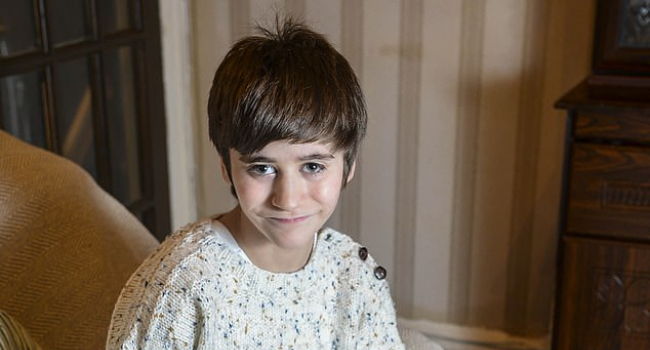Boy, 10, has a kidney in his THIGH because of a unique genetic disorder named after him
 22:30 24 January, 2019
22:30 24 January, 2019A boy is thought to be the only person in the world battling a genetic disorder that has caused his kidney to be in his leg.
Hamish Robinson, 10, from Manchester, has an ectopic kidney - when the organ is not in the right place. It strikes around one in 900 people, according to figures.
However, he is thought to be the only person in the world missing the chromosome 7p22.1, which caused the unusual placing of his kidney.
Doctors have named the genetic defect 'Hamish syndrome'. Despite being situated at the top of his right thigh, the kidney still functions.
However, his mother, Kay Robinson, 48, claims she has been told his life could be under threat because 'no-one knows what's going to happen'.
The genetic defect that has left Hamish with a kidney in the wrong place has also caused him other problems, such as he can only hear in one ear.
He also suffers severe asthmatic attacks, spinal problems, learning difficulties and requires a voice computer to speak due to the unique disorder.
Ms Robinson said she became concerned about Hamish when he wasn't reaching milestones, such as talking.
The youngster was born five-and-a-half-weeks early in May 29, 2008, weighing just 2lbs. He was discharged from hospital after three weeks.
But a paediactrician kept an eye on him as he showed complications - such as with his feeding - from the start, marking the beginning of a long journey.
Worried about his development, Ms Robinson, a former lecturer, took him to see a geneticist when he was 17-months-old.
Commenting on that trip, she said: 'He wasn't hitting some milestones but was hitting others.
'He was certainly not speaking at all, then one day when he was 17-months-old he said mamma and then I waited another six years to hear anything else.
'It was only later that I suspected things weren't right. He wasn't speaking, he wasn't doing the sort of things he should have been doing.'
Hamish, who had his first operation - for a hernia - at the age of four months old, has been under eight different consultants, including an endocrinologist, immunologist and gastroenterologist.
It was discovered when Hamish was 18-months-old that he had a unique chromosomal depletion, a condition Ms Robinson has been told that no-one else in the world suffers from.
Because of this, Hamish's doctors have struggled to find information about what to expect of Hamish's health.
Their investigations have found that individuals without 7p22.1 have a high rate of malformation affecting internal organs, mainly their heart, kidney and palate (roof of the mouth), which is not usually life threatening.
Hamish's kidney is fully functioning, but is located at the bottom of the right side of his pelvis - at the top of his right thigh - due to a structural malformation caused by his disorder.
His second kidney is located in the correct place and, although it is shaped like a horseshoe, it is fully functioning, doctors have told Ms Robinson.
Ms Robinson said: 'The kidney is fully functioning but it's the potential of what could happen in the future.
'There haven't been any health problems with it so far. Because it is functioning and he's not had any issues they have left it alone and not removed it.
'It's not like it moved, it's part of his physiology. It's a congenital condition which developed while he was a foetus.
'It has to be watched. This is what makes it so difficult because doctors don't know what could arise, we have to deal with it as it comes.
'It is just the way he is structured. It is unlikely to affect him just now but more likely when he becomes a bit older.'
She added: 'If he develops any urinary infection, when the kidney isn't in the normal place it means it's dangerous for him.'
Although it is not suggested Hamish has renal problems now, it has potential to be fatal in the future, doctors have told his mother.
Hamish has a genetic predisposition to bowel cancer, as this can be caused by faults in a number of different genes.
Source: dailymail.co.uk